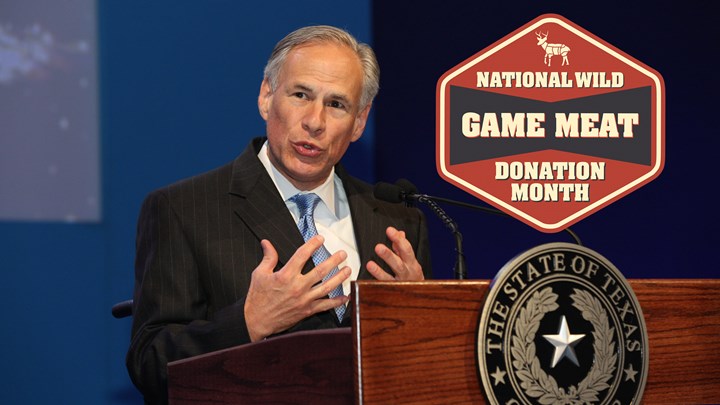
by Mark Chesnut - Friday, November 22, 2024

In an effort driven by the National Rifle Association, nine state governors recently signed proclamations declaring November to be National Wild Game Meat Donation Month. And it should come as little surprise to NRA Hunters’ Leadership Forum readers that Texas Gov. Greg Abbott was among those governors signing the proclamation.
Gov. Abbott’s proclamation comes as recent NRA HLF research shows that while America’s hunters share 119 million pounds of harvested wild game meat with others outside their households each year, many meat processors involved in game meat donation programs in 2022 said they did not receive enough game meat to fulfill their missions. It also showed that in some cases, donated deer had to be turned away by processors due to a lack of funding.
The governors’ proclamations applaud hunters for donating their surplus game meat and encourage us all to do the same as we prepare to celebrate Thanksgiving and the season of giving. Thanks in large part to the work of NRA-ILA, hunting is now enshrined in 24 state constitutions. The proclamations underscore how legal, regulated hunting offers opportunities to connect with nature while providing food security and nutrition to hunters and those less fortunate.
Texas hunters have a long history of helping the hungry through wild game meat donations through the decades-old Hunters for the Hungry movement. In fact, Austin-based Hunters for the Hungry, a part of the Feeding Texas network of food banks, is one of the top distributors of high-protein venison to Texans who might not know where they will get their next meal.
As the Lone Star State’s largest hunger relief organization, Feeding Texas is comprised of 20 food banks across the state. The group has been running its Hunters for the Hungry program since 2014 and, since then, has blessed millions of underprivileged Texas residents with venison donated by selfless hunters.
As the Lone Star State’s largest hunger relief organization, Feeding Texas is comprised of 20 food banks across the state. The group has been running its Hunters for the Hungry program since 2014 and, since then, has blessed millions of underprivileged Texas residents with venison donated by selfless hunters.
Ross Sinicropi, food resource manager for Feeding Texas, said the state’s Hunters for the Hungry program operates through Feeding Texas’ food banks located throughout the state. Through the program, hunters can drop deer at participating meat processors, who process the meat for Feeding Texas. The processing cost is completely paid through donations, so hunters don’t have to pay anything to participate. Hunters can find a list of participating processors by clicking here.
“It’s a really neat program, and we're really proud of it here,” Sinicropi said in a recent telephone interview. “When hunters are buying their license online, there’s a pop-up on the screen that asks if they want to donate to Hunters for the Hungry. That's where we get the majority of our program funding. It raises quite a bit of money. We haven't had to be too worried about going over budget or not having enough funding.”
In today’s economy, with inflation driving the ever-increasing price of red meat and other protein sources, game meat donations help solve an important problem for food banks in Texas and throughout the country.
“For food banks especially, good-quality protein is hard to come by,” Sinicropi said. “It's expensive, and especially over the last few years, it's become a lot harder for food banks to obtain that high-quality protein that they can give to the neighbors they’re serving. So, this program offers a really good opportunity for them to get that protein they need.
“A lot of people, when they think of a food bank, think of just canned goods and typical staple items. So, for them, being able to go and potentially receive venison is a great thing for our food banks and for the people they serve.”
In the Lone Star State, about 80,000 to 100,000 pounds of venison are processed through the program annually. Last year was a little lower at 60,000 pounds of donated venison, which was likely caused by a number of factors including drought conditions leading to fewer deer harvested.
“This past season we were able to provide around 237,000 meals for the program,” Sinicropi said. “We're expecting this year to be a really good year, with a big bounce back from where we were last year.”
Sinicropi said some of the hungry Texans they serve have developed a taste for venison and are very appreciative of the donations by hunters.
“Whenever the food banks do have venison, it is usually pretty popular,” he said. “We often have people reach out to us asking about venison, and we're able to direct them to their local food bank.”
Texas hunters can help feed hungry Texans through the Hunters for the Hungry program in a number of ways. First, they can donate venison at a participating processor. In Texas, home to numerous exotic (non-native) species, that includes more than just white-tailed deer. The program also accepts mule deer, axis deer, blackbuck, fallow deer, nilgai, oryx and Sitka deer.
They can also make a donation when buying their licenses and tags from the Texas Parks & Wildlife website, with the funds going to pay for venison procession. Additionally, hunters and non-hunters who want to make a financial contribution to the program can donate to it directly through the Feeding Texas website.
E-mail your comments/questions about this site to:
[email protected]
Proudly supported by The NRA Foundation and Friends of NRA fundraising.
